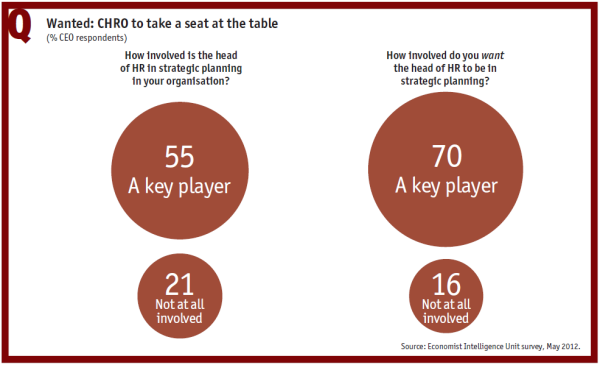5 Ways HR can be Influential in Driving Growth
Small Business • August 1, 2013 at 12:00 PM • Written by: PeopleKeep Team
The corporate world is constantly changing, and that means roles within it are changing as well. Recently these changes have been opening up opportunities for HR managers. With rapid growth of the knowledge economy and third party administration taking over many of the traditional HR and benefits tasks, HR managers now have the chance to broaden their roles and make a bigger impact in driving growth.
For example, defined contribution health benefit software reduces health benefits administration to only 5-10 minutes per month, freeing up HR's time for more strategic activities.
The Economist recently produced a report on how HR can be more influential in driving growth. Here are 5 ways that the head of HR can become more integrated, strategic, and relevant to their company.
1. Be the “People Expert"
56% of CEOs worry about insufficient talent within their companies. Other top worries of CEOs include insufficient leadership talent, lack of alignment of individual and business objectives, and low employee satisfaction. It is the duty of the HR manager to motivate employees and harness their talent. HR should get to know each employee on a personal level and learn about personal goals to make sure they are in line with the company’s goals. HR managers need to be able to get the most out of fewer people to drive growth, to do this they must understand their employees so that they know the best ways to encourage and empower them.
2. Manage the Team
The head of HR is seen by most CEOs as the “team manager” of the company. They are in charge of recruiting the team and making sure that the teams works efficiently and well together. The best way to manage a team is to make sure that everyone is on the same page. The head of HR needs to be an excellent communicator and promote an open and safe environment that the rest of the team feels comfortable to communicate in as well.
When trouble arises within the team, the CEO sees the HR manager as someone who will smooth waters over. Employees are usually not comfortable approaching the CEO with problems about the company. In this way, HR acts as an important mediator between employees and the CEO.
3. Create a Strong and Trusting Relationship with the CEO
76% of CEOs say that their relationship with the head of HR is one of their most valued relationships. This puts a lot of responsibility on HR’s shoulders and gives them the power to improve the CEO’s ideas and hone overall performance. The head of HR should be able to provide his/her CEO with practical feedback and constructive criticism. In order to do this, you need to make sure that you focus on relevant topics. These will usually be concerns that may harm the company financially. Being able to give creative and proactive solutions to these issues will gain respect from your CEO.
4. Understand the Business
The head of HR needs to understand their company corporate strategy as a whole. Knowing the processes and rules is not enough. A successful HR manager needs to focus in on strategic planning. This means making suggestions and preparations so that your company can implement its strategy and achieve its goals. Push to be included on the Board of Directors or Executive Committee. If this isn’t plausible, at least demand more time with them. This way you can explore higher level issues, gain relevancy, and develop relationships with executive positions in your company.
5. Take Initiative
Only slightly over half of CEOs believe that the head of HR is a key player in strategic planning of the company, but 70% of them want them to be key players. HR should not assume that they are deliberately excluded from the executive side of the company. They should be proactive in plans, suggestions, and feedback, ask to take on more tasks, and show the CEO that they can make an impact.

